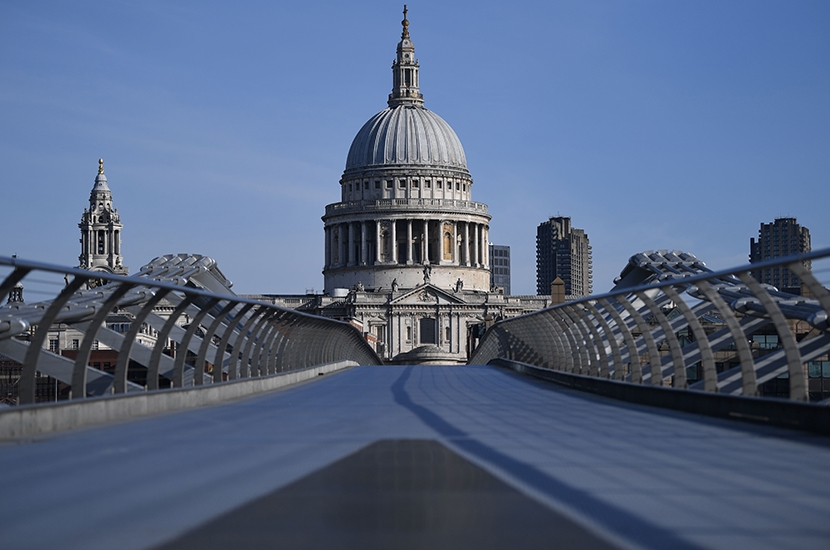For days, the Prime Minister had been resisting the kind of measures which have placed many other countries into lockdown, confining their citizens largely to their homes. Civil servants had pointed to studies saying that many ‘social distancing’ strategies might do more harm than good. In the end, the trajectory of the virus — and the global response — meant the restrictions now in place were inevitable. But at every stage, the Prime Minister has made it clear he was acting with reluctance. While he has been criticised by those seeking a heavier-handed approach, opinion polls suggest most of the country is with him.
Yet public opinion can be fickle. Support for the emergency measures is predicated on the belief that they will rapidly bring down the number of new cases of Covid-19 and related deaths. People may be inclined to take a different view if the measures have failed to reduce the death toll — or indeed if reports from Britain and around the world suggest that the virus is not as catastrophic as first feared. The death toll in Britain may reach 250,000, the figure discussed by government as a reasonable worst-case scenario, or it may end up nowhere near that. We just don’t know.
When this crisis ends, there will have to be some serious thinking about how to prepare for any future pandemic
That is why David Davis was right to demand a sunset clause to the Bill imposing these unprecedented restrictions, meaning its powers will have to be reviewed after six months. Before long, we will have a much better idea about whether the lockdown is warranted. Our understanding of the virus could increase to the point where it’s safe to re-open schools and sections of the economy — and that could be within weeks, rather than months. No crisis should be used to bring about a permanent extension of the powers of the state, or an abridgment of liberty. Yet many a leader would be tempted by such a prospect.
Boris Johnson knows this well; he was editor of this magazine when it opposed Tony Blair’s attempts to give police the power to subject terror suspects to 90 days’ detention without charge. The Blair government argued that these powers — which involved a far longer period of detention without charge than is available to police in any other democratic state — were essential to ensure the safety of citizens. Yet the Bill was rejected by the Commons, and no one has been able to make the case that a terrorist act would have been averted had it been passed.
The restrictions on freedom passed in Britain remain relatively light compared with those in some other European countries, such as Italy, France and Spain, where enforcement has bordered on the repressive. In Hungary, Viktor Orban has sought to use the crisis for a power grab that would — in effect — have him ruling by diktat.
Those admiring the ruthless efficiency with which China controlled coronavirus by sealing off cities and confining people to their homes should remember that vital days in controlling the spread of Covid-19 were lost because Xi Jinping’s administration was pretending it didn’t exist. That is the difference between a totalitarian state and a democracy — in the latter it would have been far harder to conceal the truth. There have been few new infections in China recently, which the ruling Communist party is using as an advertisement for its methods.
Far better models for how to deal with coronavirus are provided by South Korea and Singapore, both of which have successfully tackled the epidemic without confining people to their homes. They succeeded through rigorous testing and isolation of those found to be carrying the virus: a so-called ‘smart lockdown’ rather than the crude measures of asking even healthy workers to stay at home for a fortnight if someone in their house develops a cold. This has meant even the health service has been deprived of key workers in an emergency. It is a poor substitute for proper testing.
When this crisis ends, there will have to be some serious thinking about how to prepare for any future pandemic. It is certain that there will be more viruses to come, and we need to work out how to handle them without damaging the economy or placing such drastic restrictions on personal freedom — including the freedom for children to be educated in schools. It may well be that today’s restrictions have been warranted; it may well be that they should be been introduced earlier. It’s clear that existing pandemic plans — which did not envisage lockdowns of such scale and did not think through the implications — need to be rewritten.
For the moment, with the virus still spreading and deaths sharply rising, the issue of liberty will seem a remote and irrelevant concern. In Madrid, an ice rink has been turned into a temporary morgue. In Lombardy, crematoriums have been working around the clock to cope with demand. No one there has time to debate the projected statistical death rates of coronavirus: now is the time to care for the sick and bury the dead. The country and the NHS are braced for an emergency: the government response, so far, has been proportionate to the anticipated threat. But as the threat subsides, the government should respond quickly: both in reviving the economy and restoring liberty.





Comments